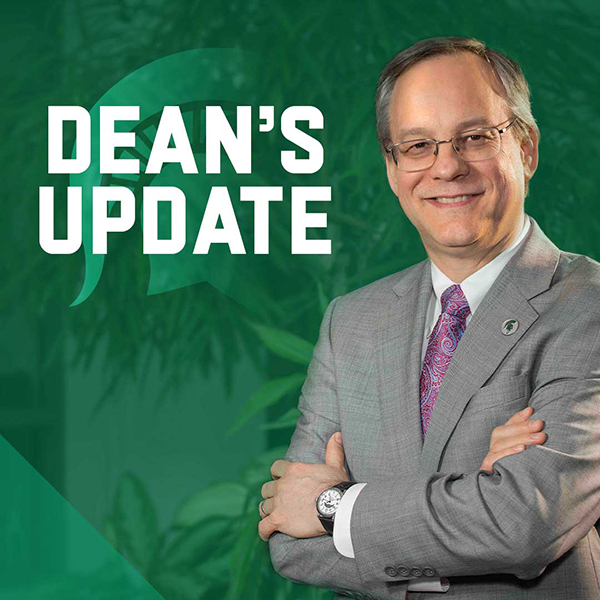Dean's Update
June 30, 2023 - Aron Sousa, MD

Friends,
Last week, I was on vacation in Colorado, in clean air, hiking from forests to just beyond the tree line, watching elk, moose, and bear. As we returned, the rest of my clan came down with COVID, and I left a key piece of my wife’s luggage on a shuttle bus. So, after a very, very early drive back to Detroit to successfully retrieve the baggage and ensure my marriage, I’ve settled into mask wearing at home to avoid the virus and mask wearing outdoors to protect my lungs. It’s been a week.
For much of the country, this week will be remembered for the Supreme Court’s reversal of long-standing policy on race-based admissions. I have only spent a few hours reading parts of the opinions and media analysis of the decision, so I am no expert. I am concerned about the impact on the educational opportunities of students we admit to the college and federal programs that support important initiatives. Our admissions process is already in compliance with the ruling. Our state made this change years ago, and across three deans our dedication has not wavered, and our energy has never flagged. As the law changes with this court or prior proposals, our dedication to the mission of the College of Human Medicine persists and our efforts to provide a physician, public health, and science workforce for all the people of Michigan is undaunted.
The college has never used race-based admissions, and under Michigan law, no public institution has been allowed to since the passage of a citizen proposition in 2006. Despite no race-based criteria or quotas, the College of Human Medicine has one of the most diverse and representative medical school classes in the country. We do focus on students from disadvantaged backgrounds and those who fit our mission, all of which is still legal. And so, students from poor high schools, students who are first generation college, students who have overcome significant challenges, students who have demonstrated a history of working with underserved populations, and students from underserved rural or urban backgrounds all readily demonstrate they fit our mission. For the applicants, we have a mission and programs that are attractive to people from diverse communities. We also avoid a series of problematic policies like legacy admissions of alumni, admitting students as political favors, and preferentially admitting the children of donors, all of which limit the room in a class for students from less privileged backgrounds. We focus on being accepting rather than focus on rejecting applicants. It works, although I will allow that we do this better than most, so your results may vary.
You may think the Supreme Court’s ruling smells sweet or stinks, but everyone in Michigan knows that our air smells bad. The wild fire smoke coming from Canada has created a haze that turns the sun orange and easy to look at even while high in the sky. It has been an irritation and irritant for me, but we should all recall that exposure to air pollution is not equally distributed in our country. People of color are likely more exposed to air pollution than Whites regardless of geography or income. Some of this is related to who works in the fields, or works in construction, or who lives near highways. My grandfathers worked in fields and construction and lived next to the highway, but after my parents’ generation of college, I garden only as a hobby, have always done indoor work, and have never lived next to a highway. Please return to the beginning of this update if you need an irony booster.
So far this week, I’ve discussed a contentious Supreme Court ruling and bad air. You know what makes all of that better? Babies! This week the Michigan legislature approved its budget, and in that approval includes $16.5 million for Rx Kids. Led by Dr. Mona Hanna-Attisha, the MSU CHM associate dean for public health, Rx Kids is a first-in-the-nation effort to proactively address health inequities with a city-wide "prescription" of unconditional and universal maternal and infant allowances. With over $33 million raised, including a $15 million match grant from the CS Mott Foundation, Rx Kids is expected to launch in January 2024 with hopeful translation across the state and nation.
Serving the people with you,
Aron
Aron Sousa, MD, FACP
Dean

